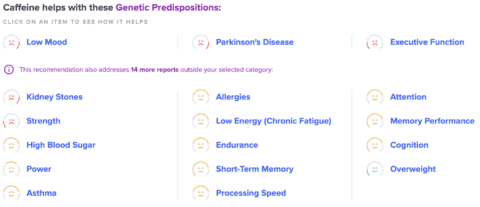
Caffeine is the world’s most popular psychostimulant, used to enhance physical and mental performance. We previously discussed a range of health benefits and potential side effects of caffeine. In this post, you will learn everything about caffeine sources, dosage, and metabolism and hear what others have to say about this famous pick-me-up.
Caffeine Sources
There are various sources of caffeine; each has a different caffeine content depending on the product types and production methods [1].
- Caffeinated chewing gum (137 – 148/150 ml) [2]
- Energy drinks (51 – 95 mg/150 ml) [3]
- Coffee (40 – 180 mg/150 ml)
- Green tea (24 – 50 mg/150 ml)
- Guarana (24 mg/ 150 ml) [4]
- Yerba Mate (15 mg/150 ml) [5]
- Soda (12 – 24 mg/150 ml)
- Black tea (8 – 39 mg/150 ml) [6]
- White tea (8 -39 mg/150 ml) [6]
- Chocolate (5 – 193 mg/150 g)
- Topical cream (5 – 45 mg/150 ml) [7, 8]
- Cocoa (2 – 7 mg/150 ml)
- Weight loss drugs/performance-enhancing pills (200 mg/pill)
Decaffeinated Coffee and Teas
There are various ways to produce decaffeinated beverages. Although many people think decaf coffee and tea is healthier, the process used to make it is far from natural.
The methods steam the coffee beans or tea leaves and add chemicals and solvents to the beans (including activated charcoal, carbon dioxide, ethyl acetate, and dichloromethane).
Depending on the method, decaffeinated coffee can still contain small amounts of caffeine [9].
Currently, researchers are developing genetically engineered coffee plants with reduced caffeine levels [10].
Caffeine Metabolism
The half-life of a drug means the amount of time for the concentration of the drug in the blood or body to reduce to 50% of its original levels. The average half-life of caffeine is 5 hours, but it can range from 2 – 9.5 hours and depends on the individual [11].
The human body readily absorbs caffeine, and it is 99% absorbed 45 minutes after ingestion. Peak levels in the blood occur between 15-120 minutes [11].
Smoking can quicken caffeine metabolism, while oral contraceptives can keep it in the body for a longer period of time [11].
Caffeine can be absorbed through the buccal mucosa (the inside lining of the cheeks and the floor of the mouth). It means that you can absorb it without swallowing [12, 13].
Caffeinated chewing gums have quicker absorption of caffeine, followed by capsules, coffee, soda, and chocolate [12, 13].
Caffeine metabolism occurs mainly in the liver. The main pathway is the formation of paraxanthine and its subsequent excretion into the urine in that form. It is also excreted in the urine in its normal form, or as different metabolism products (theophylline, uric acid, and uracil) [11, 14].
It can also be excreted through breast milk, but only in small amounts [15].
Caffeine Dosage
The below doses may not apply to you personally. If your doctor suggests using caffeine, work with them to find the optimal dosage according to your health condition and other factors.
There is no single recommended dosage as it should tailor to individual differences, their genetic variability and their history with caffeine. An effective dose can range from 32 to 1,400 mg [13].
Medium doses (225-360 mg) were effective at improving physical performance, while 100-600 mg can help improve brain performance [13].
However, doses above 250 mg can cause symptoms that mimic anxiety. Additionally, prolonged use of at least 100 mg/day can cause tolerance and/or dependence [16].
Although there is no significant evidence that caffeine consumption can harm reproductive health or cause miscarriages, doctors still recommend pregnant women to refrain from drinking too much [17].
Overdose and Toxicity
Although caffeine overdose is rare, it can happen. Caffeine toxicity can occur at 1 g while 5-10 grams can cause death [16, 18].
Signs of Caffeine Overdose [16]:
- Anxiety
- Stomach pain
- Dehydration
- Fever
- Confusion/delirium
- Nausea
- Fever
- Seizures
Cycling
Cycling is defined as taking caffeine in intervals, instead of every day. For example, some people drink 2 cups of coffee on weekdays so that they could feel more energized at work. During weekends, they do not drink any coffee to avoid developing tolerance and dependence.
Cycling may or may not be needed, depending on your own biology and response to caffeine consumption.
Synergies
1) Theanine
Theanine is an amino acid that promotes relaxation. When combined with caffeine, it may boost cognitive performance, alertness, and raise blood pressure and heart rate [19].
In a study of 44 young adults, a combination of 97 mg L-theanine with 40 mg of caffeine improved their focus during a demanding cognitive task [19].
2) ECA Stack
ECA stack stands for the mixture of ephedrine (75 to 150 mg), caffeine (150 mg), and aspirin (330 mg). Some obese, otherwise healthy subjects take ECA for weight loss, coupled with dieting [20].
However, the FDA prohibited the sale of dietary supplements containing ephedrine in 2004. because it contributed to heart disease risk and deaths and had a high abuse potential [21].
User Reviews
The opinions expressed in this section are solely from the users who may or may not have a medical background. SelfDecode does not endorse any specific product, service, or treatment. Do not consider user experiences as medical advice. Never delay or disregard seeking professional medical advice because of something you have read on SelfDecode.
Users praised caffeine tablets and supplements for help with their weight loss. They also reported improvements in their mental stress, anxiety, alertness, and memory.
Other users also commented that they use caffeine to increase their energy and help with their exercise.
However, others complained that caffeine supplements made them more tired throughout the day or not being able to sleep well at night. Also, some people experience increased heart rate and anxiety right after drinking coffee.
SelfDecode has an AI-powered app that allows you to see how caffeine may benefit your personal genetic predispositions. These are all based on clinical trials. The red sad faces denote genetic weaknesses that caffeine may counteract.
Further Reading



